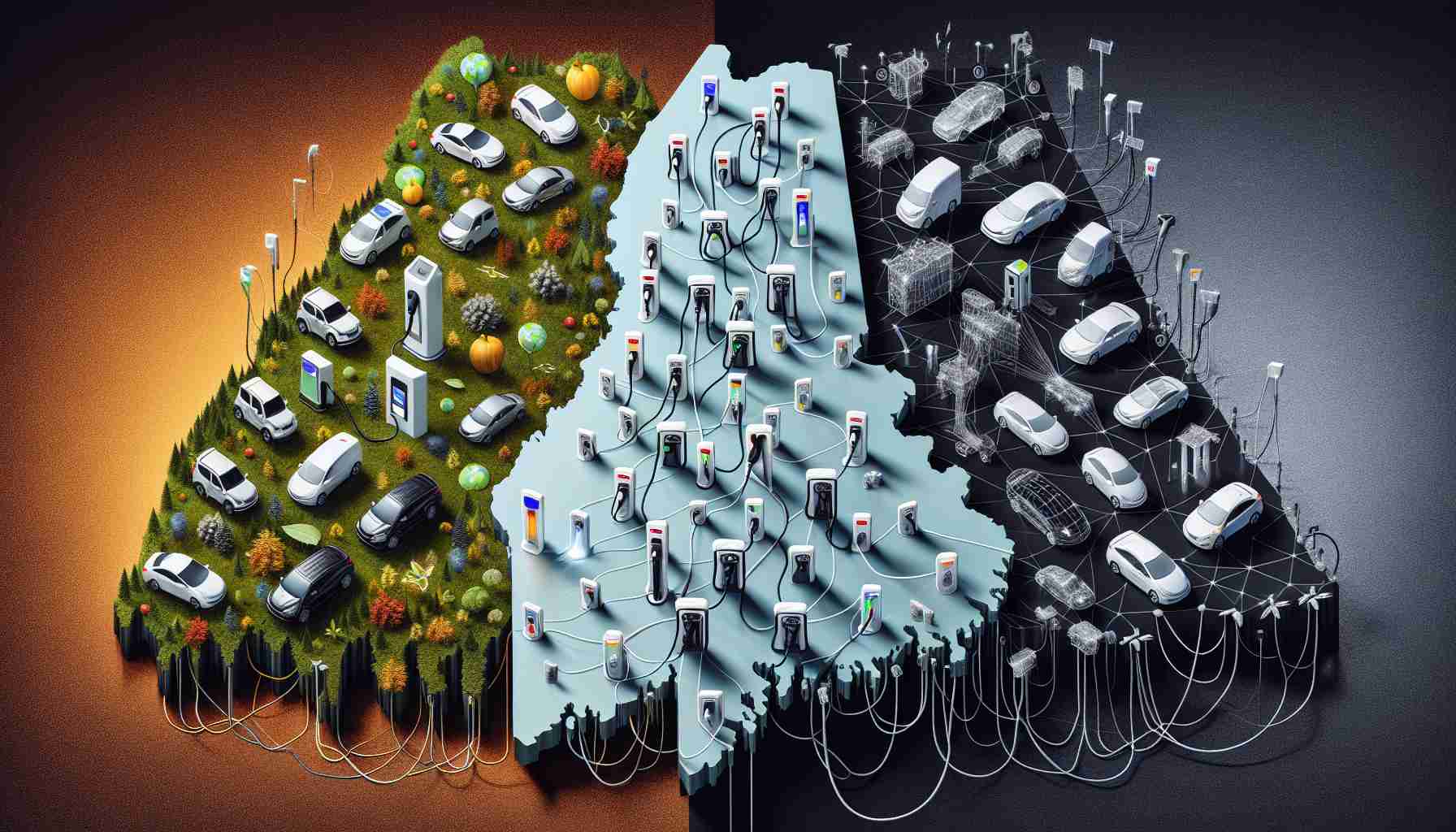- Maine’s EV charging network plans face challenges due to federal funding cuts.
- The NEVI program halt has left $4 million in intended projects uncertain.
- Maine still retains $15 million for charging stations in major cities.
- Governor Janet Mills aims to alleviate range anxiety with 52 high-speed chargers.
- Fast chargers can significantly boost EV batteries in a short time, enhancing travel confidence.
- Political skepticism exists regarding Maine’s preparedness for an expanded EV network.
- Environmental advocates emphasize the urgency of developing EV infrastructure.
Maine’s dream of a robust electric vehicle (EV) charging network is in jeopardy as federal funding gets cut, leaving $4 million in plans dangling. The Trump administration’s abrupt halt to the National Electric Vehicle Infrastructure (NEVI) program — a vital $5 billion initiative — has sent shockwaves through Maine’s efforts to enhance its EV infrastructure.
Though the U.S. Department of Transportation’s decision has created uncertainty, Maine’s Department of Transportation still holds $15 million in secured funds for charging stations in bustling hubs like Bangor, Portland, and Augusta. However, without the lost federal support, the future of these ambitious installations hangs in the balance.
To combat “range anxiety,” Governor Janet Mills has proposed adding 52 high-speed charging stations across 17 sites, aiming to provide EV drivers with the confidence to travel farther and faster. These fast chargers can give an electric vehicle an 80% boost in just 20 minutes — a game changer for long journeys!
Yet, political debates swirl as some lawmakers question Maine’s readiness for an expansive EV network. Environmental advocates continue to push for urgent action to combat climate change, creating a dramatic backdrop against this funding crisis.
The key takeaway? Without robust federal support, Maine’s vision of a comprehensive EV charging network may face significant hurdles. The road ahead looks rocky, and how the state navigates its EV ambitions amidst shifting political tides will determine if electric dreams become a reality!
Maine’s EV Charging Network Faces a Bumpy Road: What You Need to Know!
Maine’s ambitions for a comprehensive electric vehicle (EV) charging network are now under serious threat due to cuts in federal funding. Originally planned as part of the National Electric Vehicle Infrastructure (NEVI) program, which allocated $5 billion nationwide, Maine was looking forward to leveraging these funds to enhance its EV infrastructure. However, the abrupt cessation of federal support leaves the state facing significant challenges.
Current Status of Maine’s EV Charging Infrastructure
Despite the setback, Maine’s Department of Transportation is still in possession of $15 million earmarked for EV charging stations located in key urban areas, including Bangor, Portland, and Augusta. This funding remains critical as state officials rally to make use of these reserves amid dwindling federal backing.
Key Developments:
– High-Speed Charging Stations: Governor Janet Mills has initiated plans for an ambitious addition of 52 high-speed charging stations distributed across 17 strategic locations. The aim is to alleviate “range anxiety,” ensuring that EV drivers enjoy improved access and convenience.
– Charging Speed: These high-speed chargers can provide an 80% charge in just 20 minutes, significantly enhancing the travel experience for long-distance EV users.
Political Climate and Environmental Implications
The political landscape is rife with skepticism regarding the feasibility of a robust EV network in Maine. Some lawmakers express doubts about the state’s readiness for such an expansive infrastructure. Meanwhile, environmental advocacy groups are increasing their calls for proactive measures against climate change, emphasizing the urgency of developing comprehensive EV solutions.
Additional Insights
– Market Trends: As electric vehicles gain popularity across the U.S., the demand for charging infrastructure is expected to increase significantly. A lack of accessible chargers can stifle growth in EV adoption.
– Sustainability Focus: Transitioning to electric vehicles plays a crucial role in reducing carbon emissions, making the establishment of a dependable charging network vital for meeting climate goals.
Important Related Questions:
1. What is the National Electric Vehicle Infrastructure (NEVI) Program?
The NEVI program was established to fund the development of EV charging infrastructure across the U.S., aiming to facilitate long-distance travel for electric vehicles. Its termination poses challenges for states like Maine.
2. How can Maine manage its EV infrastructure with reduced federal funding?
If federal funding remains cut, Maine can focus on maximizing its state-secured funds and exploring public-private partnerships to finance and install charging stations effectively.
3. What are the potential consequences of inadequate EV charging infrastructure?
A lack of sufficient charging stations can lead to decreased EV adoption due to range anxiety among consumers, ultimately impeding efforts to combat climate change and harming the state’s environmental objectives.
For more information on EV developments and sustainability initiatives, visit Maine Government and check out their resources.


















